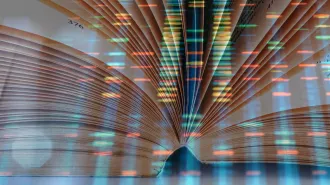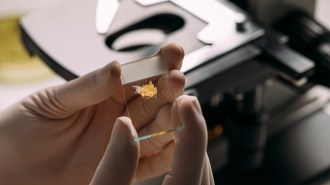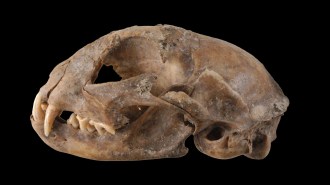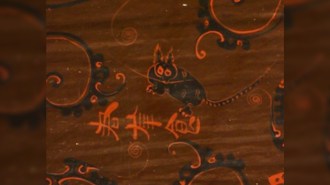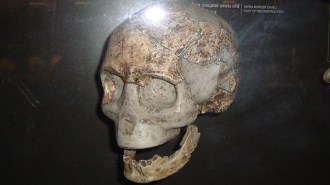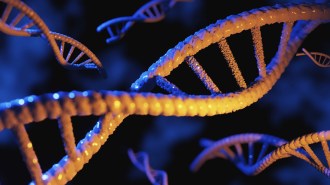View the video
A technique that puts one woman’s nuclear DNA into another woman’s donor egg cell may be feasible for correcting inherited diseases caused by faulty cellular power sources. The technique has already produced healthy baby rhesus monkeys, and now it raises the possibility of preventing mitochondrial diseases in thousands of people each year.
Mitochondria, energy-producing organelles inside cells, carry circles of DNA important for the power plants’ function. Mutations of the mitochondrial DNA, which is passed to offspring directly by their mothers, can cause diseases that often affect energy-greedy organs such as the brain, heart, muscles, pancreas and kidneys with varying severity. An estimated 1,000 to 4,000 U.S. babies are born each year with mitochondrial diseases.
Swapping the nucleus, the cellular compartment where chromosomes are housed, from an egg with mutant mitochondria into one containing functional power plants could stop those diseases from happening in the first place. Offspring would inherit healthy mitochondria from the egg donor, while the rest of their genetic makeup would come from the mother and father.
Researchers led by Shoukhrat Mitalipov, a reproductive and developmental biologist at Oregon Health & Science University in Beaverton, previously demonstrated that the technique works with rhesus monkeys. Now the team has succeeded in transferring the nuclei of unfertilized human eggs into donor eggs and then fertilizing those eggs to create embryos that produce embryonic stem cells, the team reports online October 24 in Nature. Short of actually transplanting the embryos into women to grow into babies, stem cell production is the clearest sign that the embryos are normal.
Performing the transfer procedure in the United States for women who carry faulty mitochondria, and implanting resulting embryos in the womb, will require approval of the federal Food and Drug Administration, which oversees clinical trials involving gene therapy.
Although the experimental therapy requires transfer of a nucleus into an egg, as human cloning would, it does not raise the same ethical concerns as human cloning, says Josephine Johnston, a research scholar at the Hastings Center, an organization in Garrison, N.Y., that examines the ethics of biological research. “To me it’s not human cloning,” Johnston says. “It’s not the creation of an individual who is genetically identical to an existing person.”
Not everyone is comfortable with the technique because children would carry DNA from three parents — a set of chromosomes each from the mother and father, and mitochondrial DNA from an egg donor. “Any time reproduction is proposed to take place in a novel way, some people get nervous,” Johnston says. But if the technique is safe, she says, she sees no major ethical concerns barring it from reaching the clinic.
Rhesus macaques produced using the technique are now healthy 3-year-olds, Mitalipov and his colleagues report. “They are as normal as they can get,” he says.
Human eggs proved trickier to work with than those from monkeys, the researchers found. About half of zygotes created by fertilizing eggs that had undergone the nuclear transfer were abnormal.
That result doesn’t surprise Mary Herbert, a reproductive biologist at Newcastle University in England. “The unfertilized egg has the complex task of remaining poised in readiness to halve its DNA content upon sperm entry. Given the biological complexities associated with maintaining this state, we have always held the view that manipulation of the egg at this stage would be rather precarious,” she said in a statement on behalf of her research team.
Previously, Herbert and her colleagues had performed a similar technique using fertilized human eggs, extracting and transferring the “pronuclei” —the nuclei from the parents’ egg and sperm before the two have fused — into healthy donor eggs. Using fertilized eggs reduces the risk of abnormal fertilization, she says.
The Oregon researchers have tested that method in macaques without success, Mitalipov says. “Embryos fail early and no pregnancies established,” he said of his groups’ unpublished experiments. The failure may be due to drugs applied to the cells to make the technique work.
But transferring nuclei in unfertilized eggs shows promise, and Mitalipov hopes to win FDA approval for human clinical trials. “The FDA has been slow to respond,” he says. “Meanwhile, every year, thousands and thousands of children are born with mitochondrial diseases, so we’d like to hurry up.”
Cloning-related Mitochondrial Repair Procedure
Inherited diseases caused by faulty microscopic power plants, called mitochondria, may be prevented by extracting the chromosome-containing nucleus from a mother’s egg cell and then placing the nucleus in a donor egg that has healthy mitochondria. Here, researchers at Oregon Health & Science University in Beaverton demonstrate the procedure, which uses fine needles to collect and transplant the nucleus.
Credit: OHSU
Back Story | POWER SHORTAGE
Rare, harmful mutations in mitochondrial DNA began coming to light in the 1980s, when scientists first began detailed studies of the mitochondrial genome. The small, circular piece of DNA encodes proteins necessary for energy production. So far, more than 300 dangerous mutations have been discovered.
Though symptoms can vary widely among mitochondrial disorders, they all seem to arise from the same underlying cause: a chronic shortage of energy caused by defects in the body’s cellular power-producing machinery. Often, energy-intensive organs such as the heart, brain and muscles are most affected by mutations in mitochondrial DNA. — Laura Sanders
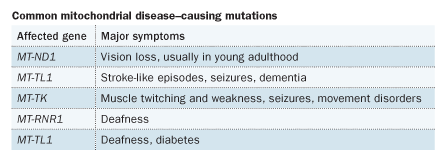
Source: l. Greaves et al/Journal of Pathology 2012
